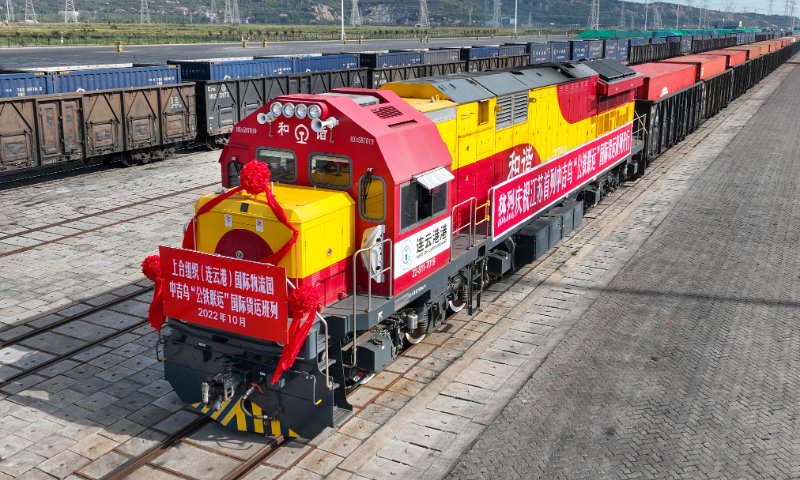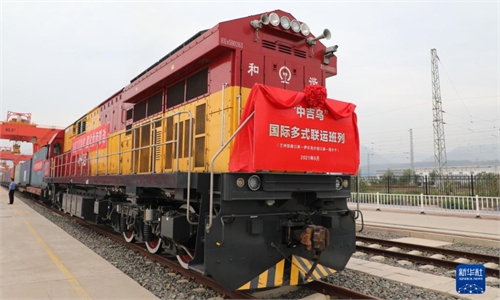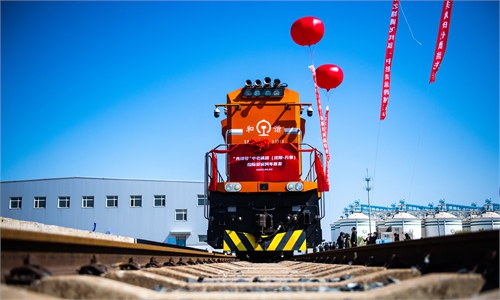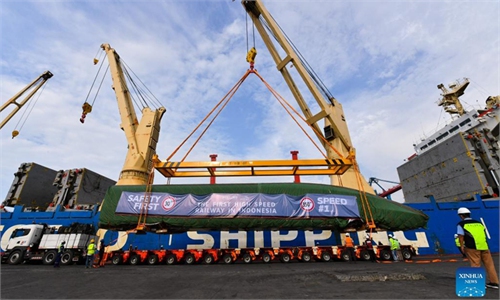Multimodal logistics paving way for future trade along China-Kyrgyzstan-Uzbekistan railway: analyst

The freight train under the China-Kyrgyzstan-Uzbekistan road-rail intermodal transport system departs from Lianyungang, East China's Jiangsu Province on October 13, 2022. Photo: VCG
Using multimodal logistics to send goods from China to Kyrgyzstan and Uzbekistan will build momentum for international trade ahead of the China-Kyrgyzstan-Uzbekistan railway becoming a reality, a Chinese railway expert said on Friday.
Southwest China's Chongqing municipality, one of the first Chinese cities to participate in the China-Europe freight train service, opened a multimodal transportation route linking China, Kyrgyzstan and Uzbekistan on Thursday.
A freight train left Chongqing on Thursday carrying 120 tons of Chinese tea, and it will offload the cargo in Kashi, Xinjiang, from where trucks will continue to transport the goods to Kyrgyzstan through Irkeshtam Port, the westernmost port in China. The whole journey will take 15-20 days, Chongqing-based Yuxinou Logistics Co told the Global Times, noting that the opening of the route is based on market demand.
Zhang Ruiyu, a manager from the company, said using multimodal international logistics shortens the distance and time needed, and the new trade route will reduce pressure in existing ports.
Currently, the majority of goods, by railway and by road, transit through Alashankou Port and Khorgas Port.
Sun Zhang, a railway expert from Shanghai Tongji University, said that while trade via road and rail does not follow the same route, there are similarities in terms of market access, business intelligence and customs clearance.
"Such 'preparatory' work in building up trade links will be a boon, to be multiplied when the China-Kyrgyzstan-Uzbekistan (CKU) railway is realized," Sun told the Global Times on Friday.
In September, a cooperation agreement addressing the CKU railway construction project - long-anticipated after nearly 20 years of negotiation - was signed at the Shanghai Cooperation Organisation summit held in Samarkand, Uzbekistan.
China is the largest trading partner for both Kyrgyzstan and Uzbekistan.
The CKU railway is regarded as a "southern" land-based route in the Eurasia continental transportation network, offering potential sub-routes to link up with Pakistan and Afghanistan.
Many Chinese companies have already moved to set up a foothold in these new markets. For instance, chemicals, agriculture and logistics company Xinjiang Zhongtai (Group) Co, Xinjiang's first Fortune Global 500 firm, said it has begun actively exploring the potential opportunities along the route of the CKU railway.
Sun said multimodal transport and the "southern" route, together with the soon-to-be-completed Jakarta-Bandung High-speed Railway, will link up Central Asian countries with markets that are part of the Regional Comprehensive Economic Partnership. "The obstacles of mountains and seas will be bridged by inventive transportation methods," Sun noted.




